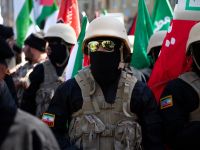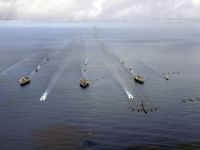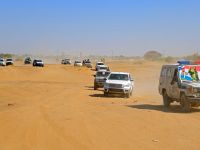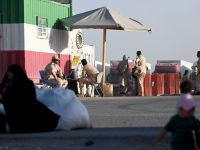Israeli-Palestinian violence flared for the fifth straight day on Monday as Prime Minister Ehud Barak put the blame for the wave of deadly clashes on Yasser Arafat's Palestinian Authority.
Meanwhile, Washington was mobilizing in a bid to quell the violence, which further threatens the already faltering peace process.
An Israeli man was shot dead on a road near a Palestinian village in the West Bank, while in the divided flashpoint city of Hebron, Israeli soldiers fired rubber bullets on stone-throwing Palestinian demonstrators.
Fighting triggered by a controversial visit by Israeli right-wing leader Ariel Sharon to a hotly disputed sacred site in Jerusalem Thursday has so far claimed the lives of 37 people, most of them Palestinians, and left around 1,000 people wounded.
Barak said the Palestinian Authority bore a heavy responsibility for the violence, which spilled over from the West Bank and Gaza on Sunday into Arab towns inside Israel itself.
"Palestinian police act on direct orders from the Palestinian Authority. It should assume its responsibility: end the violence and restore calm," Barak told Israeli radio.
"The Palestinian Authority bears a heavy responsibility, and is compromising the continuation of negotiations that should put a definite end to such violence."
Speaking before a weekly cabinet meeting with the clashes top of the agenda, at which security chiefs were invited to assess the situation, Barak said the main task in the coming days would be "to end the bloodshed," but did not elaborate.
Barak also insisted that the cause was "more complicated" than the visit by Sharon to the al-Aqsa Mosque compound in occupied east Jerusalem, a site holy to both Jews and Muslims that is the key stumbling block in efforts to end 52 years of Israeli-Palestinian conflict.
In Washington, the White House said US President Bill Clinton would chair a meeting of Israeli and Palestinian leaders in an effort to quell the violence.
US officials said the meeting would occur somewhere in the region, without saying where or when.
Clinton spoke by telephone at weekend with both Barak and Palestinian leader Yasser Arafat, who agreed to holding the meeting.
In the first incidents Monday, an Israeli man was shot dead apparently while he was driving near the Palestinian village of Bidya in the West Bank, police said, although the circumstances of the killing were not immediately clear.
In Hebron, Israeli soldiers fired rubber bullets on dozens of Palestinian youths throwing stones near the border between the Israeli and Palestinian controlled areas of the city.
The Israeli army has blockaded the city, preventing residents from entering or leaving, and imposed a curfew on the Jewish enclaves.
No injuries were immediately reported.
In the Gaza Strip, two convoys carrying Jewish settlers in armored buses came under fire near Gush Khatif but no injuries were reported.
Elsewhere, an Israeli police officer suffered light wounds after being beaten by several assailants near the Lion's Gate entrance to the Old City.
Several roads serving Arab towns in Israel remained blocked by piles of rocks and blazing tires after a day of clashes that left one Arab Israeli dead and dozens more injured.
But Israel's Deputy Defense Minister Ephraim Sneh pointed the finger of blame at the Likud leader, saying, "I don't believe Ariel Sharon can be a partner with us after what he did Thursday."
"Despite our anger, we must remember that our objective is to conclude a peace agreement with the Palestinians and that an association with Sharon would see the end of that hope," Sneh added - JERUSALEM (AFP)
© 2000 Al Bawaba (www.albawaba.com)







